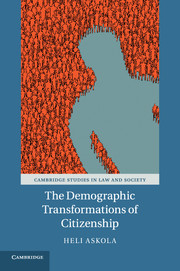Book contents
- Frontmatter
- Contents
- Acknowledgements
- 1 Introduction
- 2 Missing Citizens? Birth Rates and the Making of New Citizens
- 3 Misguided Citizens? Transitions into Adulthood and the Management of Diversity
- 4 Casual Citizens? The Desirable Labour Migrant and Conditional Citizenship
- 5 Depleting Citizens? Ageing Populations, Care and Migration
- 6 Conclusion
- Bibliography
- Index
- CAMBRIDGE STUDIES IN LAW AND SOCIETY
5 - Depleting Citizens? Ageing Populations, Care and Migration
Published online by Cambridge University Press: 05 September 2016
- Frontmatter
- Contents
- Acknowledgements
- 1 Introduction
- 2 Missing Citizens? Birth Rates and the Making of New Citizens
- 3 Misguided Citizens? Transitions into Adulthood and the Management of Diversity
- 4 Casual Citizens? The Desirable Labour Migrant and Conditional Citizenship
- 5 Depleting Citizens? Ageing Populations, Care and Migration
- 6 Conclusion
- Bibliography
- Index
- CAMBRIDGE STUDIES IN LAW AND SOCIETY
Summary
This chapter explores a much-lamented success story: that of increasing longevity and growth in the proportion of older people in contemporary societies. The cause of this demographic ageing of states in the Global North is the transition from high to low levels of fertility and mortality (and many less wealthy states will be, or are already on their way to experiencing the same phenomenon). The ‘maturing’ of contemporary states, where people live far longer and healthier lives than previous generations, is in many ways a great and unprecedented achievement. However, and importantly, increasing longevity is hardly ever framed in this way in public debates – instead, it is typically discussed in negative and fearful, even apocalyptic terms, focusing on the problems associated with ageing, from concerns over economic growth and the sustainability of pension and social security systems to pressures on health and social services related to the increased care needs of the growing elderly population. Demographic ageing thus has many implications for debates on the future of citizenship, especially in the context of funding and providing care for ageing populations. These are not only manifested in changes in the way the citizenship of older persons is conceived, but also linked to increased mobility, regarding both people migrating to provide care for older people and older people wishing to migrate with their future care needs in mind. Though much has been written about the women, including migrant care workers, who provide formal and informal care for the older people, and about the international division of caretaking labour these care patterns implicate, some of the other links between the ageing of populations and international migration, including the migration of older people to join their adult children abroad, have been relatively under-explored.
As a case study, this chapter examines Finland, which is noteworthy because of its particularly advanced state of demographic ageing, which is putting increasing pressures on the Finnish welfare state. The proportion aged 65 years old and older is growing more rapidly than in any other EU Member State, and Finland's old age-dependency ratio will be among the highest of all EU countries by around 2020–25.
- Type
- Chapter
- Information
- The Demographic Transformations of Citizenship , pp. 147 - 187Publisher: Cambridge University PressPrint publication year: 2016



